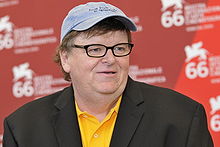The current division between America's political parties does not lie in their view of government. (Both like it if they have it.) It's not, as the sketch above shows, between silly and sensible.
It's more basic than that. It's in their attitude toward problem-solving.
Conservatives think it's simple. Liberals insist it's complicated.
Having written a bit on health care, and gotten a ton of talkbacks from readers about the subject, I know whereof I speak. Conservatives insist the problem is easy to solve with a bit of market ideology, while liberals run into complex answers that sometimes end up nowhere.
Conservatives have one answer. Every liberal has their own answer.
TV prefers the simplicity. The Internet embraces the complex. That's the difference between the mediums of the past and the future.
When liberals claim to be part of the "reality-based community," what they're really saying is that life is complex but conservatives won't admit it.
Ideology, by its nature, is simple and appealing.
It boils down problems to enemies, and solutions to slogans. The great struggles of the 20th century were against ideologies that saw simple solutions to every problem. Communist ideology extolled the proletariat. Fascist ideology extolled the nation.
But in the process of defeating these enemies we created our own ideology, American Conservatism, and it is this force we must fight now. Like Communism, like Fascism, it says simply that if we get rid of some "other," then run everything by simple rules imposed from the top, paradise would result.
Paradise never results from ideology, whether that ideology is religious, allegedly scientific, or frankly nationalistic. Everyone's paradise is different, most are incompatible, and the best we can do on this Earth is the best we can.
Liberals were disabused of ideology by the events of the 1950s and 1960s. They let themselves become identified with communist and socialist ideologies, switched to all kinds of -isms, and finally left power to principled conservatives who at least could unite and agree on what ought to be done.
The "Third Way" of the Clintons, the AntiThesis to the Nixon Thesis of Conflict, overtly accepted complexity. The confidence of Bill Clinton was that he was smart enough to make progress, despite the complexity, only he himself turned out to be more complex than any of his supporters imagined.
Every new Thesis emerges from the old AntiThesis, so the Third Way deserves serious study. It's important in the same way the Nixon Thesis emerged from McCarthyism, Franklin Roosevelt's liberalism emerged from Wilsonian populism, and Progressives were descendants of the Mugwumps from 1880 onwards. Lincoln was a Henry Clay Whig.
The Obama Thesis of Consensus accepts that problems are complex, that solutions are complex, but that negotiation can create fine adjustments which lead the country forward. If it's a European attitude, it's one grounded as much in Christian Democracy as in Social Democracy.
The President's big mistake this year has been assuming he had a partner with which to bargain. He didn't. He faced, and still faces, a simplistic ideology that boils every solution down to a slogan, every problem to an easily-identified enemy, and that resists ever taking responsibility for anything it does, insisting that someone "failed" the ideology, never that the ideology might be capable of error.
We saw this throughout the summer with the Tea Party crowd and the town hall mobs. It was a great show, sometimes compelling television, but there was (and is) no compromising with it. Its idea of compromise is that you give in to it and go away.
Many liberals thought this strain of conservatism would go away with George W. Bush, whose answer to every setback was to repeat himself louder. In fact Bushism was a true bottom-up phenomenon. He was far more in touch with "his people" than his father was. He identified completely with the ideology of simplicity.
It's hard to sell complexity. Simplicity is, superficially, far more appealing. But this President, and his political party, did manage the trick in both 2006 and 2008, insisting that problems were complex but tractable, and promising not magic, but continued hard work by the brightest experts that could be found.
This is one promise the President has fulfilled. His Secretary of Energy is a Nobel laureate. His Treasury Secretary ran the New York Federal Reserve Bank. Secretary of State Clinton has been involved in politics longer than most Americans have been alive. And so on down the line. They are, all of them, distinctly non-ideological. They're technocrats.
Their solutions have also turned out to be non-ideological. The President likes charter schools. He accepts the advice of his generals, he doesn't dispute reality with bankers, and he doesn't dispute science with scientists. He takes reality as given, and has the self-belief to think he can find solutions to problems, if not the first time they're faced then the second or the third. It can all be worked out, it can all be negotiated. It''s complex, it's hard, it takes time and energy, but that's the only way forward.
The Simple Party, meanwhile, admits to no mistakes in the past, except by people who failed the ideology, and keeps coming back with the same mantra of "lower taxes," "get government off our backs," and "kill the enemy" it has followed for a decade.
One of the most brilliant rhetorical tricks of this decade is currently taking place in the person of Michael Moore (right). When challenged as a socialist or a communist, he responds that he's an American and a Christian, seeking only to "perfect the union" by shining the light on malfeasance and trusting the good sense of the American people to right wrongs. He has taken the Republicans' bridge to the 19th century and gotten off in 1890, alongside Jacob Riis, Jane Addams, young Lincoln Steffens and Upton Sinclair.
Against ideology, Moore counters with framing. He waves the flag, he invokes God, he says here are the problems and let's work on solutions. This is quite a contrast to his early work, where problems like gun control were simple and the answers equally simple, or where the villains of Fahrenheit 911 were easy to spot and simply opposed. Then, he was playing the game the way conservatives played it. Now he's playing it as liberals need to.
The President's rhetoric is of a piece with that. He constantly evokes our history, our story, our progress. He points down the hill to show how far we've come and urges us to keep climbing, step by step, because progress is hard. His liberalism is that of Kennedy — "we choose to do the hard things because they are hard." His framing is that of Lincoln — "let us bind up the nation's wounds." It's deliberate.
But the President's policies are complicated. Health care is complicated. Climate change is complicated. Afghanistan is complicated. These are not simple problems. They will not deliver simple solutions. We will try, fail, and try again. We will put our best experts on it and try to make steady progress, free of ideological blinders. We will negotiate.
It's tough to sell, this Obama Thesis of Consensus. But it can be sold. It just needs to be framed, and that frame needs to be used, until conservatives divide and their ideology is conquered.














